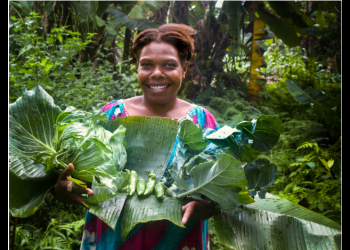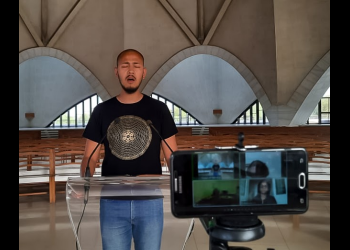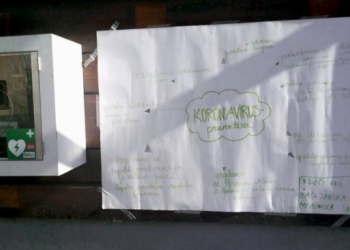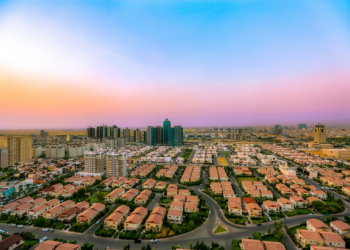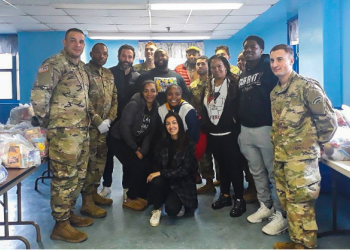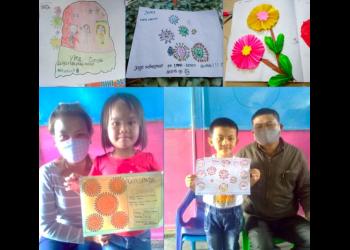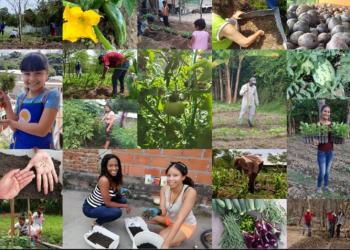Navigating a global health crisis: Responses of Baha’i communities around the world
Communities around the world are demonstrating tremendous courage and resilience in response to the COVID-19 pandemic. Baha’is and their collaborators are seeking to contribute to the well-being of their communities by learning how to apply social and spiritual principles to fill unmet needs at all levels. They are working to contribute to the flourishing of nations that the 2030 Agenda, and the United Nations more broadly, seeks to encourage. The examples below are offered as a contribution to the constructive response to the current crisis.
COVID-19, despite its terrible impact on societies, is exposing glimmerings of an increased appreciation for humanity’s inherent oneness. From Italy to Uganda, the United States to Vanuatu, Kazakhstan to Sierra Leone, unity and fellow feeling, knowledge and understanding, a spirit of collective worship, and common endeavor are emerging as foundational prerequisites to responding to current realities, regardless of culture, geography, or circumstance. Notable in this regard is the important role that religion plays in the vast majority of societies around the world; the examples below highlight its constructive force in the face of growing challenges.
The role of religion
“The world stands more and more in need of the hope and the strength of spirit that faith imparts.”
With mounting suffering faced by individuals across diverse realities, religion inspires action to contribute to material and spiritual progress in spite of the circumstances.
-
In Uganda, Baha’i community members are using radio to bring hope and joy to their neighbors, encouraging prayer and meaningful conversation. This has inspired acts of service in their societies, supporting in particular those who are most vulnerable.
-
In Italy, online gatherings of a devotional nature are offering hope to friends and family members as well as neighbors and colleagues.
-
Baha’i Houses of Worship, such as in Chile, the United States, and India, are adopting new, virtual approaches to infuse society with the spirit of collective worship that these structures embody.
-
In Indonesia, regular online gatherings to pray for and consult upon the well-being of the community have provided a space for members to naturally reflect on how they can help others in their neighborhoods. Their conversations have led to an initiative that produces and distributes masks to those who need them most.
-
Baha’i-operated radio stations around the world, including in the Philippines, are providing critical information during the pandemic. They are broadcasting education materials supplemented with stories inspired by spiritual themes for children whose schools have been closed because of public health measures.
-
In Chile, a program was prepared for a national media outlet by the Baha’i community in partnership with the Chilean Association for Interreligious Dialogue exploring how religion can inspire hope in responding constructively to the health crisis.
Coherence between science and religion
“There is no contradiction between true religion and science. When a religion is
opposed to science it becomes mere superstition: that which is contrary to knowledge
is ignorance.”
Recognizing that science and religion must be in harmony, many Baha’i communities are finding ways to inform their societies about effective responses to the pandemic.
-
In Tunisia, the Baha’i community has joined with diverse religious and civil society organizations highlighting the importance of both science and religion to guide an effective response. These actors are working to dispel views that may be at odds with science or the advice of health professionals while promoting respect for safety measures put in place by the government.
-
In Sierra Leone, a group of youth used film to convey information about effective health measures, assisting doctors, village leaders, and other members of the community to raise awareness as broadly as possible.
An exploration of spiritual principles
“The bedrock of a strategy that can engage the world’s population in assuming responsibility
for its collective destiny must be the consciousness of the oneness of humankind.”
Baha’i communities and their collaborators have been recognizing the importance of examining, promoting, and cultivating spiritual qualities which are most needed at this time. Among them is a greater appreciation of our shared identity as part of one human family.
-
In Slovenia, members of the Baha’i community have been engaging in conversations within the wider community about the importance of unity and collaboration, as well as the need for spiritual renewal, less materialism, and how best to contribute to their society.
-
In the Democratic Republic of the Congo, youth are writing songs for radio broadcasts to teach the whole community about the crisis and to inspire solidarity as daily patterns are changed to save lives.
-
In Luxembourg, children participating in moral education classes of the Baha’i community, wishing to demonstrate a spirit of solidarity, have been making cards and drawings expressing gratitude to those working in essential services.
-
Baha’i communities throughout the world, including in Belarus, have been using the arts to stimulate reflection on the spiritual dimension of human life and inspire hope. Whether through music, paintings and drawings, theatre, puppet shows, poetry, and digital designs, such works have focused on revealing the beauty that exists in the world and conveying new perspectives on current circumstances.
-
The Baha’i community of Canada has launched a podcast mini-series bringing together academics and social actors to explore how insights from religion can shed new light on contemporary challenges amid the current public health crisis.
-
Academics and social actors from around the world offer reflections, in response to an invitation from the Baha’i Chair for World Peace at the University of Maryland in the United States, on lessons emerging during this health crisis, touching on economics, the environment, media, and other areas of life. The contributions aim to broaden understanding and knowledge as well as to inspire action in response to the pandemic.
-
The Baha’i Chair for Studies in Development at Devi Ahilya University, Indore, India, has been bringing together economists and academics in a series of online gatherings to examine the effects of the pandemic on marginalized people in order to promote long-term approaches to development thinking.
-
Youth throughout the world, including in France, have been exploring questions concerning social change and the pandemic at online gatherings promoted by the Institute for Studies in Global Prosperity, a Baha’i-inspired educational and research organization.
Unity in action
“Nothing can be effected in the world, not even conceivably, without unity and agreement, and the perfect means for engendering fellowship and union is true religion.”
In addition to highlighting the importance of unity as a spiritual principle, many communities have been demonstrating this spiritual principle through their efforts to collaborate at all levels of society. They have been engaging with leaders, prominent thinkers, and commentators, exploring fundamental concepts and bold aspirations that, in recent times, might have largely been absent from public discourse.
-
In India, including in a village in Bookanakere, Baha’i communities together with local organizations and institutions, are working to transcend traditional barriers and prejudices that have historically kept individuals apart in their responses. Creating support structures for the most vulnerable people in their community has allowed for the delivery of medicine, food supplies, and other essentials to those who are confined to their homes and rallied blood donations in response to an urgent call from a provincial Health Minister.
-
In Kazakhstan, the Baha’i community convened an online discussion as part of its efforts to contribute to the discourse on social cohesion with academics, government officials, social actors, and religious representatives exploring how the current circumstances can strengthen societal unity.
-
In Iraq, Baha’is in the Kurdistan region have organized weekly online forums where academics, social actors, faith leaders, and government officials examine spiritual principles that have drawn people together during the pandemic and explore how these principles can shape public life in the future including how society suffers when any one group considers its own needs without thought for others.
-
Around the world, including in Jordan and Spain, the Baha’i community has been having conversations with journalists and other social actors about the role of the media in responding to the pandemic by focusing on topics such as humanity’s interconnectedness.
Resilient communities
“From every race, religion, nationality, and class, souls are uniting around a vision of humanity as one people and the earth as one country. Many who have long suffered are finding their voice and becoming protagonists of their own development, resourceful and resilient.”
Numerous accounts have also shown how efforts to reinforce an appreciation for humanity’s shared identity have made certain communities especially resilient in adapting to new circumstances.
-
In Vanuatu, individuals engaged in a Baha’i-inspired educational program that develops the capacity to serve society have expanded personal gardens and planted crops that can be harvested quickly to create reliable sources of food over the coming months of uncertainty.
-
In Nicaragua, communities implementing a Baha’i inspired community banking program founded on principles of service and concern for the well-being of society have taken measures to support the economic life of the community and are seen as an example of sound and safe business practices in the midst of the pandemic.
-
In the Central African Republic, Baha’i-inspired community schools have found creative ways to decentralize their efforts and to continue to serve their students’ educational needs, with classes held in the homes of parents and smaller numbers of children, as permitted by current health measures in the country.
-
Concerned about a potential food crisis in light of the pandemic, Baha’is in Nepal have devised a long-term strategy to develop agricultural capacity within the community by connecting returning migrant workers with opportunities to farm uncultivated plots.
-
Anticipating the long-term ramifications of the pandemic, in Colombia, the Baha’i-inspired organization FUNDAEC (Fundación para la Aplicación y Enseñanza de las Ciencias) is supporting local food production initiatives through the creation of online workshops and monthly bulletins providing information related to home gardens, larger farming plots, food processing, and distribution.
-
In South Africa, Baha’i healthcare workers are forming online networks to provide emotional support to those who are in quarantine or are recovering from COVID-19.
-
In Bolivia, the Baha’i-inspired educational institution Nur University has adapted its operations in light of the pandemic by forming committees to check on the well-being of students through regular calls, and intentionally reflecting on the types of technology appropriate for the culture and specific needs of the community as it maintains engagement with students.
-
In El Salvador, teachers at a Baha’i-inspired school have been collaborating with families and community members to find creative ways of maintaining a high standard of education to its students, paving a new path for the intellectual and spiritual education of their communities.
-
In Honduras, the Baha’i community formed an emergency committee and network to channel people and resources to respond to the pandemic; the same emergency mechanisms have since proven to be essential in responding to other shocks faced by the community, such as hurricanes Eta and Iota.
The role of youth
“… tens of thousands of youth, unwilling to succumb to triviality or to settle for easy conformity, have now been brought within the widening embrace of a conversation and pattern of action of far-reaching consequence regarding how to live a coherent life and be
an agent of spiritual and social transformation.”
The important role of youth in responding to the pandemic has become particularly apparent throughout the world as many activities are being spearheaded by young people. These individuals, participating in educational programs that have instilled in them a sense of responsibility for their society, have learned to adapt to the circumstances and offer services to their communities.
-
In the United States, a group of youth in a suburb in New York City contacted the board of education and various vendors in the area, who agreed to donate meals to children whose primary source of food each day had come to a halt with school closures. They arranged for the community room in their apartment complex to be made available as a distribution point, with measures to ensure physical distancing and sanitation.
-
In other parts of the United States, similar groups of young individuals have organized teams to assist with food distribution, financial aid, and academic tutoring in diverse languages, as well as online tutorials to assist older adults in their communities with ordering supplies online.
-
Youth in Italy are also exploring online platforms, offering songs and artistic presentations to provide hope and a space to reflect on meaningful themes.
